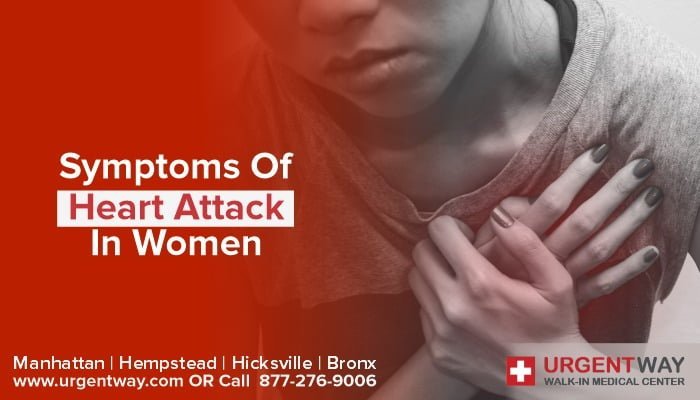A heart attack is a life-threatening condition caused by a blockage in the heart’s blood supply. Knowing the female-specific symptoms of a heart attack may help them seek medical assistance sooner, perhaps saving their lives. The most observed symptom of a heart attack that can occur immediately or lasts for several days is chest pain. Chest pain causes tightness of the upper body part and is responsible for discomfort in women. Women have a lower chance than males of surviving their first heart attack. This may be because the symptoms vary between men and women. Women are more prone than males to suffer from a “silent” heart attack or have atypical symptoms. Although a heart attack, also known as a myocardial infarction, may be deadly, but treatment has vastly improved over the years. If you believe you’re suffering a heart attack, contact 911 or get emergency medical assistance right away.
Heart attack symptoms vary:
Not everyone who has a heart attack has the same symptoms or intensity of symptoms. Some individuals have moderate discomfort, while others experience very severe pain. Some individuals have no signs or symptoms of a heart attack. But Sudden chest pain may be the initial symptom for some. The higher the number of signs and symptoms of heart attack you experience, the more likely you are to experience a heart attack. Although some heart attacks occur unexpectedly, many individuals have warning signs and symptoms hours, days, or weeks beforehand. Recurrent chest pain or pressure (angina) that is induced by exercise and alleviated by rest may be the first sign.
Symptoms before a heart attack in women
Eight of the possible symptoms of heart attack are:
i. Chest pain
Females’ chest pain or discomfort is the most prevalent sign of a heart attack.
It may be identified as follows:
- Tightness
- Pressure
- Squeezing
- Aching
Women, on the other hand, may have a heart attack without any chest pain. In the weeks leading up to the attack, 29.7% of the women polled in the 2003 research reported chest pain. In addition, 57 percent of those who suffered a heart attack had chest pain.
ii. Extreme or unusual fatigue
In the weeks preceding a heart attack, severe fatigue is common. Fatigue is also felt in the moments leading up to the event. Even simple activities that do not take a lot of effort may leave you tired.
iii. Weakness
A frequent immediate sign of a heart attack in a woman is feeling weak or shaky. This weakness or shaking may be accompanied by other symptoms of a heart attack such as:
- Anxiety
- Dizziness
- Fainting
- Feeling lightheaded
iv. Shortness of breath
Shortness of breath or heavy breathing without effort, particularly when accompanied by tiredness or chest pain, may indicate a heart problem. When laying down, some women may have shortness of breath, which improves when they sit up.
v. Excessive sweating
Another frequent symptom of a heart attack in women is excessive perspiration without a known reason. Cold and clammy sensations may potentially indicate heart problems.
vi. Pain in the upper body
This is generally non-specific and cannot be linked to a specific upper-body muscle or joint.
Areas that can be affected include:
- Neck
- Jaw
- Upper back or either arm
Pain may begin in one region and gradually extend to others, or it may appear at any time.
vii. Sleep disturbances
In a 2003 research, almost half of the women said they had trouble sleeping in the weeks leading up to a heart attack.
These disturbances may involve:
- Difficulty getting to sleep
- Unusual waking throughout the night
- Feeling tired despite getting enough sleep
viii. Stomach problems
Before a heart attack, some women may experience discomfort or pressure in their stomachs. Other digestive problems that may be linked to a potential heart attack include:
- Indigestion
- Nausea
- Vomiting
Symptoms of Heart Attack
If you have any of these signs, call 911 and get to a hospital right away.
- Uncomfortable pressure, squeezing, fullness, or chest pain are all possible symptoms. It lasts more than a few minutes or disappears then reappears.
- Back, neck, jaw, or stomach pain or discomfort in one or both limbs.
- Shortness of breath that may or may not be accompanied by chest pain or discomfort.
- Other symptoms include a chilly sweat, nausea, and lightheadedness.
The most frequent symptoms of a heart attack include chest pain or discomfort, much as in males. However, several of the other frequent symptoms, such as shortness of breath, nausea/vomiting, and back or jaw discomfort, are more prevalent in women than in males. There are two kinds of symptoms to predict a heart attack in women, symptoms before a heart attack and symptoms during a heart attack. Symptoms of heart attack are fatigue, weakness, short breathing, chest pain, sweating, upper body pain, sleep disorders, and stomach problems which can indicate the possibility of a heart attack in women. While squeezing, fullness or chest pain, pain in arms, nausea, and joint pain occurs when you’re suffering from a heart attack.


